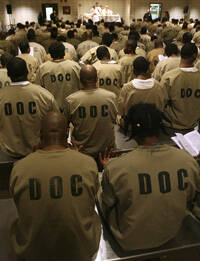Extreme overcrowding in California’s prison system, the nation’s largest, led a panel of three federal judges in early February to call for reducing the state’s prison population by a third. The prison system holds twice the number it was designed for, with tiered bunks filling gyms and classrooms. The judges were especially alarmed by the effects of the crowding, which has led to deterioration in mental and physical health care, preventable deaths and suicides at the rate of one a month—a situation so dire they called it a violation of the Eighth Amendment’s prohibition against cruel and unusual punishment. A primary cause of the crowding is mandatory minimum sentencing policies, which essentially tie judges’ hands in meting out sentences, especially regarding drug offenses, which are common. California has made extensive use of such sentences and also the so-called “three strikes laws,” which require sentences of 25 years to life for third-time felony offenders, no matter what the third offense is.
California’s incarceration problems, however, are simply outsized reflections of what is happening around the country. The Bureau of Justice Statistics reported in December that the nation’s prison population continues to rise, with almost 2.5 million people behind bars. Many prisons are managed privately by groups like the Corrections Corporation of America. In the United States the overall cost of incarceration exceeds $60 billion a year.
Sentencing practices in Europe, by contrast, tend to be far more conducive to rehabilitation. In Norway, for example, few prisoners serve more than 14 years, even for such a serious crime as murder. In many cases prisoners receive weekend parole after they have served seven years. This allows them to maintain contact with their families, which has long been recognized as a key factor in lowering recidivism rates. In Italy, after serving 10 years a prisoner may be permitted to work in the community during the day.
The situation of some children in correctional facilities in the United States also cries out for change. Prosecuted as adults, many children as young as 13 are serving life sentences in adult facilities, where abuse is common. A related issue concerns an increase in the number of incarcerated parents. According to the nonprofit Sentencing Project, 1.7 million children have a parent in prison, an increase of over 80 percent since 1981. Most such parents live in prisons that are more than 100 miles from their homes, and as a consequence half never receive visits from their children. That situation is counterproductive, since strong family and community relationships increase the chances of a successful transition back into the community. (When those with felony drug convictions are eventually paroled, their transition is made still more difficult because they are banned specifically from receiving welfare and food stamps.)
The judges in California suggest sensible steps to reduce prison crowding without endangering public safety. One is to improve the parole procedures that currently contribute to the high rates of recidivism. In California and other states, one in three prisoners released on parole is incarcerated again within three years because of inadequate supportive planning. Also, sentences should be shortened for nonviolent offenders. And more offenders ought to be enrolled in local programs, like addiction-control programs, that would keep them close to their communities. Steps like these could remove from the United States its embarrassing title as world leader in the percentage of its population behind bars.
A few states have already taken steps in the right direction. A bipartisan group of legislators in Virginia, for instance, has suggested releasing early some nonviolent offenders, including those convicted of drug possession, who would be sent to mandatory treatment programs early in their sentences rather than toward the end. Lawmakers in Washington State allow early release for up to half of all nonviolent offenders.
Although it might be tempting in a time of rising unemployment for states to build more prisons, such an approach is no remedy. Ryan King, a policy analyst at the Sentencing Project, told America that the problems at the root of the overcrowding—hasty parole revocations, mandatory sentence laws and lack of re-entry planning—would remain in an expanded prison system, with the same nonviolent offenders cycling through and filling the prisons. What is needed is a humane and cost-effective restructuring of key aspects of the criminal justice system, like those suggested by the California judges. State legislators can and should make structural changes that would reduce the severe overcrowding in prison facilities around the country. Addressing draconian sentencing policies would be a good place to start.








